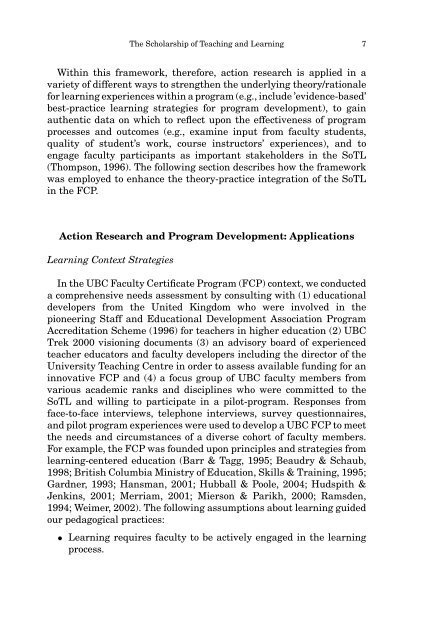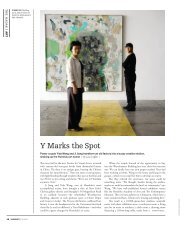The Scholarship of Teaching and Learning: TheoryâPractice - NAIRTL
The Scholarship of Teaching and Learning: TheoryâPractice - NAIRTL
The Scholarship of Teaching and Learning: TheoryâPractice - NAIRTL
You also want an ePaper? Increase the reach of your titles
YUMPU automatically turns print PDFs into web optimized ePapers that Google loves.
<strong>The</strong> <strong>Scholarship</strong> <strong>of</strong> <strong>Teaching</strong> <strong>and</strong> <strong>Learning</strong> 7<br />
Within this framework, therefore, action research is applied in a<br />
variety <strong>of</strong> different ways to strengthen the underlying theory/rationale<br />
for learning experiences within a program (e.g., include ’evidence-based’<br />
best-practice learning strategies for program development), to gain<br />
authentic data on which to reflect upon the effectiveness <strong>of</strong> program<br />
processes <strong>and</strong> outcomes (e.g., examine input from faculty students,<br />
quality <strong>of</strong> student’s work, course instructors’ experiences), <strong>and</strong> to<br />
engage faculty participants as important stakeholders in the SoTL<br />
(Thompson, 1996). <strong>The</strong> following section describes how the framework<br />
was employed to enhance the theory-practice integration <strong>of</strong> the SoTL<br />
in the FCP.<br />
Action Research <strong>and</strong> Program Development: Applications<br />
<strong>Learning</strong> Context Strategies<br />
In the UBC Faculty Certificate Program (FCP) context, we conducted<br />
a comprehensive needs assessment by consulting with (1) educational<br />
developers from the United Kingdom who were involved in the<br />
pioneering Staff <strong>and</strong> Educational Development Association Program<br />
Accreditation Scheme (1996) for teachers in higher education (2) UBC<br />
Trek 2000 visioning documents (3) an advisory board <strong>of</strong> experienced<br />
teacher educators <strong>and</strong> faculty developers including the director <strong>of</strong> the<br />
University <strong>Teaching</strong> Centre in order to assess available funding for an<br />
innovative FCP <strong>and</strong> (4) a focus group <strong>of</strong> UBC faculty members from<br />
various academic ranks <strong>and</strong> disciplines who were committed to the<br />
SoTL <strong>and</strong> willing to participate in a pilot-program. Responses from<br />
face-to-face interviews, telephone interviews, survey questionnaires,<br />
<strong>and</strong> pilot program experiences were used to develop a UBC FCP to meet<br />
the needs <strong>and</strong> circumstances <strong>of</strong> a diverse cohort <strong>of</strong> faculty members.<br />
For example, the FCP was founded upon principles <strong>and</strong> strategies from<br />
learning-centered education (Barr & Tagg, 1995; Beaudry & Schaub,<br />
1998; British Columbia Ministry <strong>of</strong> Education, Skills & Training, 1995;<br />
Gardner, 1993; Hansman, 2001; Hubball & Poole, 2004; Hudspith &<br />
Jenkins, 2001; Merriam, 2001; Mierson & Parikh, 2000; Ramsden,<br />
1994; Weimer, 2002). <strong>The</strong> following assumptions about learning guided<br />
our pedagogical practices:<br />
• <strong>Learning</strong> requires faculty to be actively engaged in the learning<br />
process.











